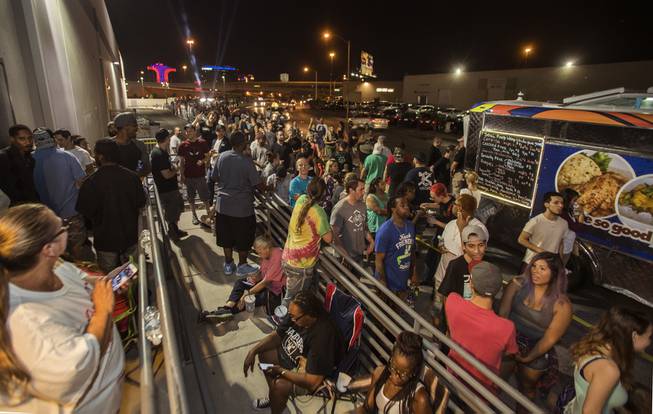
Customers wait in a long line at Reef Dispensaries in Las Vegas as recreational marijuana sales begin at midnight in Nevada on Friday, June 30, 2017.
Monday, June 10, 2019 | 2 a.m.
Related Content
Weeks before the end of the Nevada legislative session, Gov. Steve Sisolak announced plans to use revenue generated from the state’s marijuana excise sales tax to fund public education.
The following week, Clark County commissioners moved to divert $1.8 million of the revenue it generates from marijuana licensing fees to fight homelessness.
In light of these recent developments in Nevada’s marijuana money, here’s a breakdown of how much marijuana-related revenue is circulating and what that money is funding.
State: Excise tax money now going to schools
In May, lawmakers introduced Senate Bill 545, which proposes moving all money collected from the state’s 10% excise sales tax on marijuana to education.
Previously, the state was only sending revenue generated from a separate, 15% excise tax on wholesale marijuana to Nevada’s Distributive School Account. In fiscal year 2018, that revenue amounted to a total of $27,270,582 into the DSA.
Money in the DSA gets distributed to districts across the state on a per pupil basis, but allocations will change under Nevada’s new education funding formula. The new formula will no longer be “circular,” meaning new money from outside sources added to the DSA – including money from marijuana excise wholesale and retail taxes – is offset by an equivalent reduction in state funds.
While the revenue generated from the excise sales tax and wholesale tax has fluctuated since recreational marijuana was legalized in 2017, it has shown overall growth, said Brandon Wiegand, director of operations at the dispensary company Nevada Organic Remedies.
“It’s more than stable,” Wiegand said.
Even in the event of an economic downturn, Wiegand is confident that the excise sales tax will provide a reliable, needed funding boost to public schools.
“I think there’s some insulation against a recession,” he said, pointing to the fact that liquor sales tend to hold steady or get a boost when the economy lags. “Cannabis is a product that people want to use.”
In fiscal year 2018, the state collected $42,489,202 in revenue from its excise marijuana sales tax statewide. Pending Sisolak’s approval of SB545, all new money generated through that tax and the excise wholesale tax will be diverted into the DSA starting July 1.
How much of that money makes it to Clark County schools, one of the most underfunded major school districts in the nation, remains in question.
“We don’t have a specific figure at this time,” said Melinda Malone, director of communications at CCSD.
Clark County typically gets about 60-65% of all funds in the DSA, although the exact process for divvying up those funds across the state is “relatively complicated,” said Chris Daly, Deputy Executive Director of Government Relations at the Nevada State Education Association.
County: Marijuana money fighting homelessness
Clark County commissioners voted in May to allocate nearly $1.8 million in marijuana business license fees to several regional homelessness organizations. The move is part of the county's commitment to spend up to $12 million of its marijuana licensing revenue per year to fight homelessness, which commissioners announced in January.
In fiscal year 2019, which will end June 30, the county received $9.7 million in business license fees — already higher than the amount generated in fiscal year 2018, which was $9.4 million. Previously, that revenue was going toward the county’s general fund, said Dan Kulin, public information officer for Clark County.
Now, the county will allocate most or all of that money to HELP of Southern Nevada, the Shannon West Homeless Youth Center and other homelessness causes. Commissioner Tick Segerblom said the revenue has been increasing by an average of $800,000-900,000 per month.
“The plan is to use those funds more and more for homelessness programs,” Segerblom said.
Since the start of fiscal year 2015, Clark County has collected $206,595,000 in licensing fees alone.
City: Marijuana revenue still in general fund
Las Vegas has generated less funding in marijuana licensing and application fees than Clark County, coming to a total of $7,978,867 since the start of fiscal year 2015. The fees go into the city’s general fund, as was the case in Clark County until January.
“[They’re] used to defray the costs to support monitoring and enforcement of marijuana activity, licensing, audits, police, marshals, legal support, financial reporting costs, technology costs, and other general support service costs,” Margaret Kurtz, a public information officer for the city, wrote in an email.
As is the case in Clark County, marijuana-related revenue generated in the city has been increasing over the years. Between fiscal year 2018 and fiscal year 2019, revenue went up from $2,040,441 to $2,949,225, compared to $1,568,260 in fiscal year 2016.
City officials have no plans to divert the licensing revenue to a specific cause as Clark County did, Councilman Bob Coffin said.
“It’s not a lot of money, when you think about it,” Coffin said. “That’s why we [took] it in as general fund money five years ago.”
Statewide: Cautious approach to taxing
Although Wiegand said he supports measures to fund education and other needs through marijuana revenues, he warned against relying on the industry to fill funding holes.
He also noted that the industry is already getting stretched thin; in addition to excise sales and retail taxes and local licensing fees, marijuana businesses pay state licensing fees as well as interjurisdictional licensing fees in some situations. They’re also subject to standard sales taxes.
“If we continue to look at the cannabis industry as a piggy bank to fill budget shortfalls and gaps, at a certain point we’re going to kill the golden goose,” Wiegand said.
